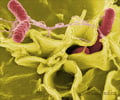Research from two recent NASA space missions discovered key elements of the Salmonella bacteria's disease-causing potential that hold promise for improving ways to fight food-borne
Research from two recent NASA space missions discovered key elements of the Salmonella bacteria's disease-causing potential that hold promise for improving ways to fight food-borne infections on Earth.
Salmonella is a leading cause of food poisoning and related illnesses.According to the Centers for Disease Control and Prevention, approximately 40,000 cases of Salmonella infections are reported in the United States each year.
The Salmonella experiments were flown on shuttle missions to the International Space Station (ISS) in September 2006 and March 2008.
The 2006 experiment results allowed researchers to identify a molecular "switch" that appears to control Salmonella's response to spaceflight in unique ways not observed using traditional experimental approaches on Earth.
The 2006 results showed that the space environment causes a short-term alteration in Salmonella virulence - the bacteria cultured in space were more virulent than those on Earth.
The 2008 experiment confirmed the 2006 results and demonstrated that a change in the growth environment of the bacteria controls its virulence.
Advertisement
In addition to finding a leading candidate as to why the bacteria becomes more virulent in space, results from the 2008 experiment helped researchers identify ways to counter the virulence effect.
Advertisement
The space experiments helped researchers show that a mechanical force known as "fluid shear," the motion of fluid that cells sense as fluid passes over their surface, could have a dramatic effect on Salmonella's disease-causing potential.
Lower fluid shear conditions, it turns out, are found both in microgravity and in our intestines.
The bacteria cultured in space are more virulent, and Nickerson's work showed that by modifying the medium in which the cells are grown, the virulence could be reduced, or turned off.
According to Julie Robinson, program scientist for the International Space Station at NASA's Johnson Space Center in Houston, "This research opens up new areas for investigations that may improve food treatment, develop new therapies and vaccines to combat food poisoning in humans here on Earth, and protect astronauts on orbit from infectious disease."
Source-ANI
SRM












